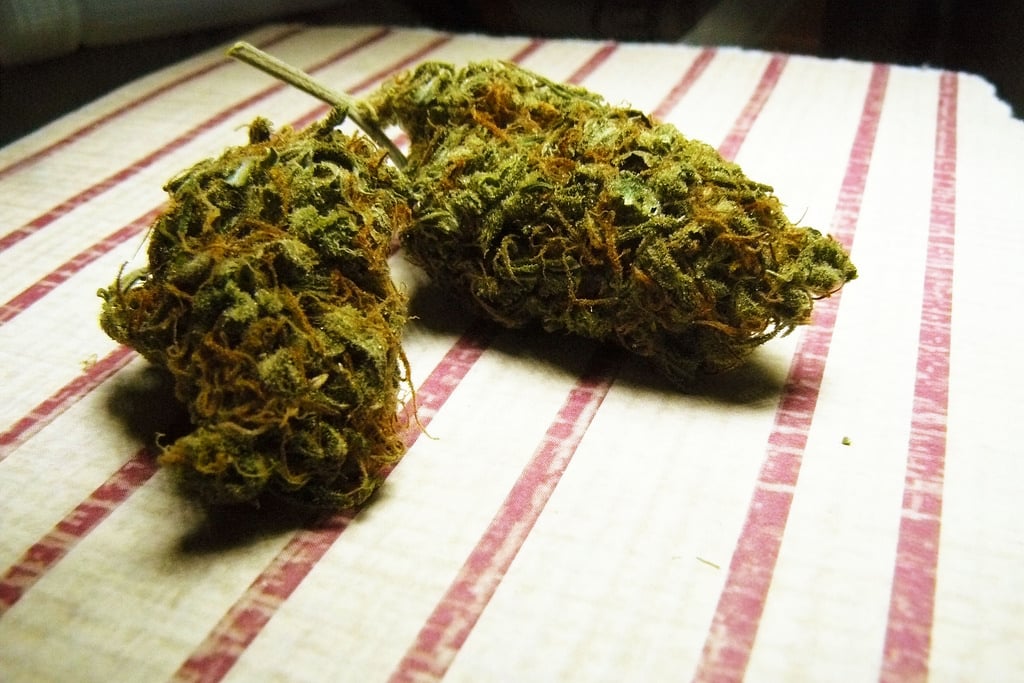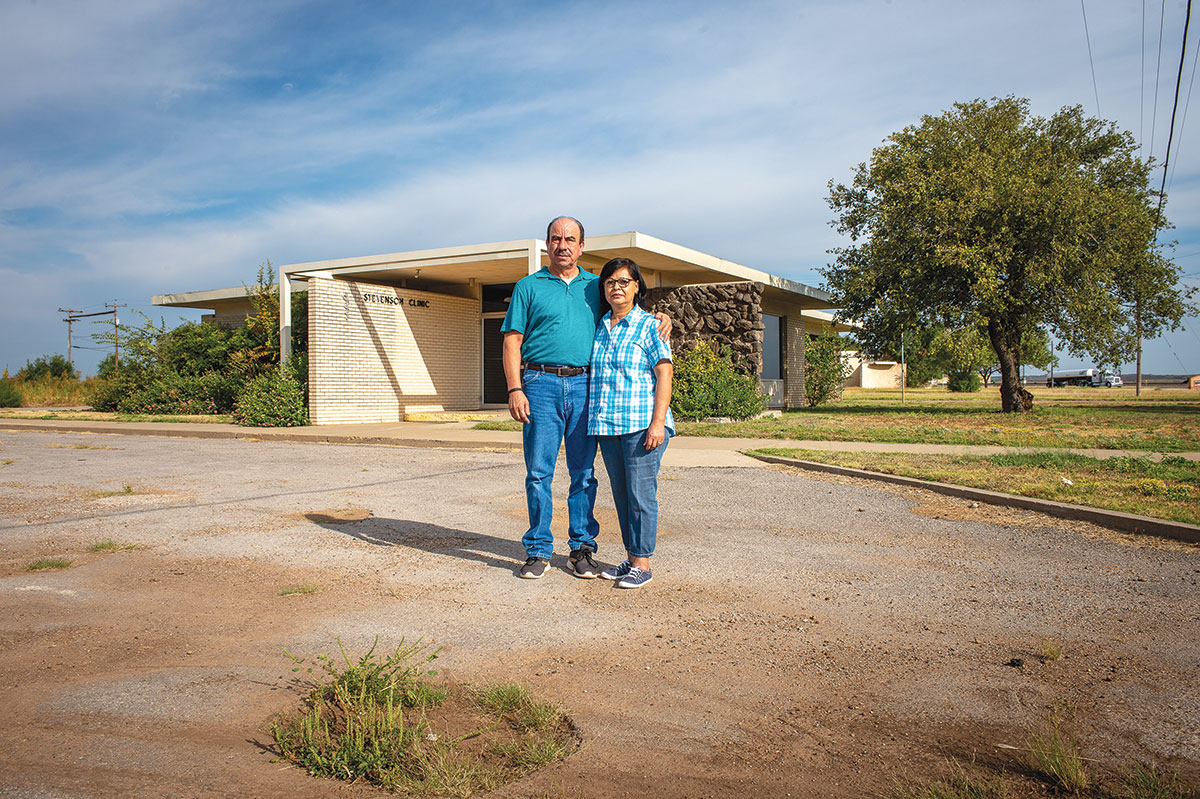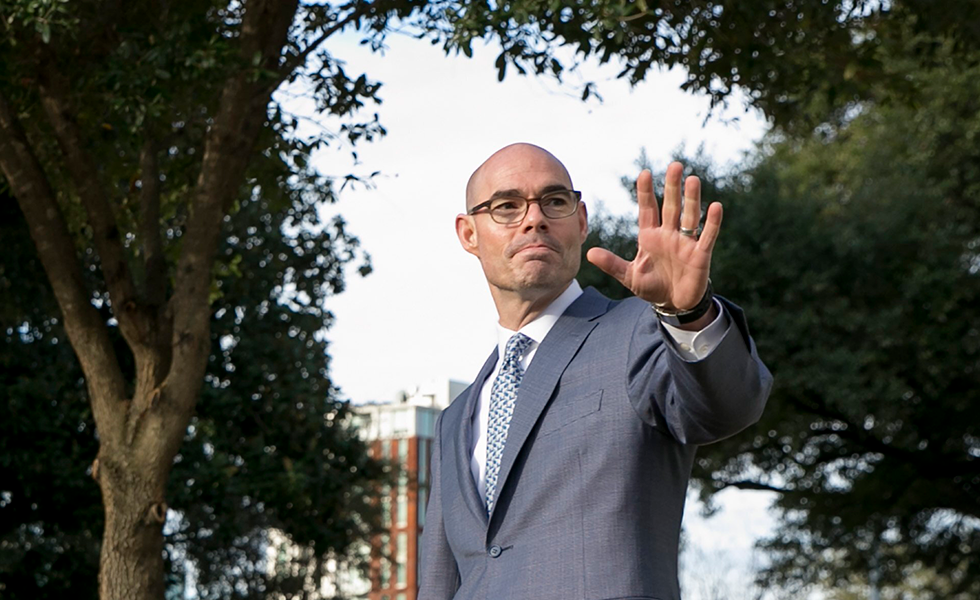Democratic Socialists of America members are pushing progressive local policies, organizing disaster relief and running Sanders-style candidates — all in the GOP’s top stronghold.

by Gus Bova
@bova_gus
April 30, 2018
In late January on the anniversary of Trump’s inauguration, about 40 mostly young activists gathered outside of a downtown Dallas high school, practicing chants as they waited for the Women’s March to begin. The morning’s overcast skies contrasted with the squad’s gaudy lobster-red T-shirts, bearing the portmanteau “Y’allidarity” and identifying the wearers as members of the Democratic Socialists of America, or DSA. They held signs reading: “A woman’s place is in her union”; “Feminism for the 99%”; and “Grab ’em by the means of production.”
Across the street, as many as 10,000 were assembling in front of a red-brick Methodist church, many sporting pink “pussy hats” and carrying signs alluding to recent feminist pop culture: Star Wars, The Handmaid’s Tale and Wonder Woman. The socialists would join them soon, but for now they stayed separate.
At protests, DSA contingents often arrive with their own banners, signs and messages more radical than those of traditional liberal activists. During the march that day, the group stayed together, chanting “Free abortion on demand” and “Stand up! Unite! The working class is here to fight.” But unlike many socialist groups, DSA actively engages mainstream liberals and the Democratic Party — what some leaders refer to as an “inside-outside” strategy, one they hope will lead to a truly mass organization.
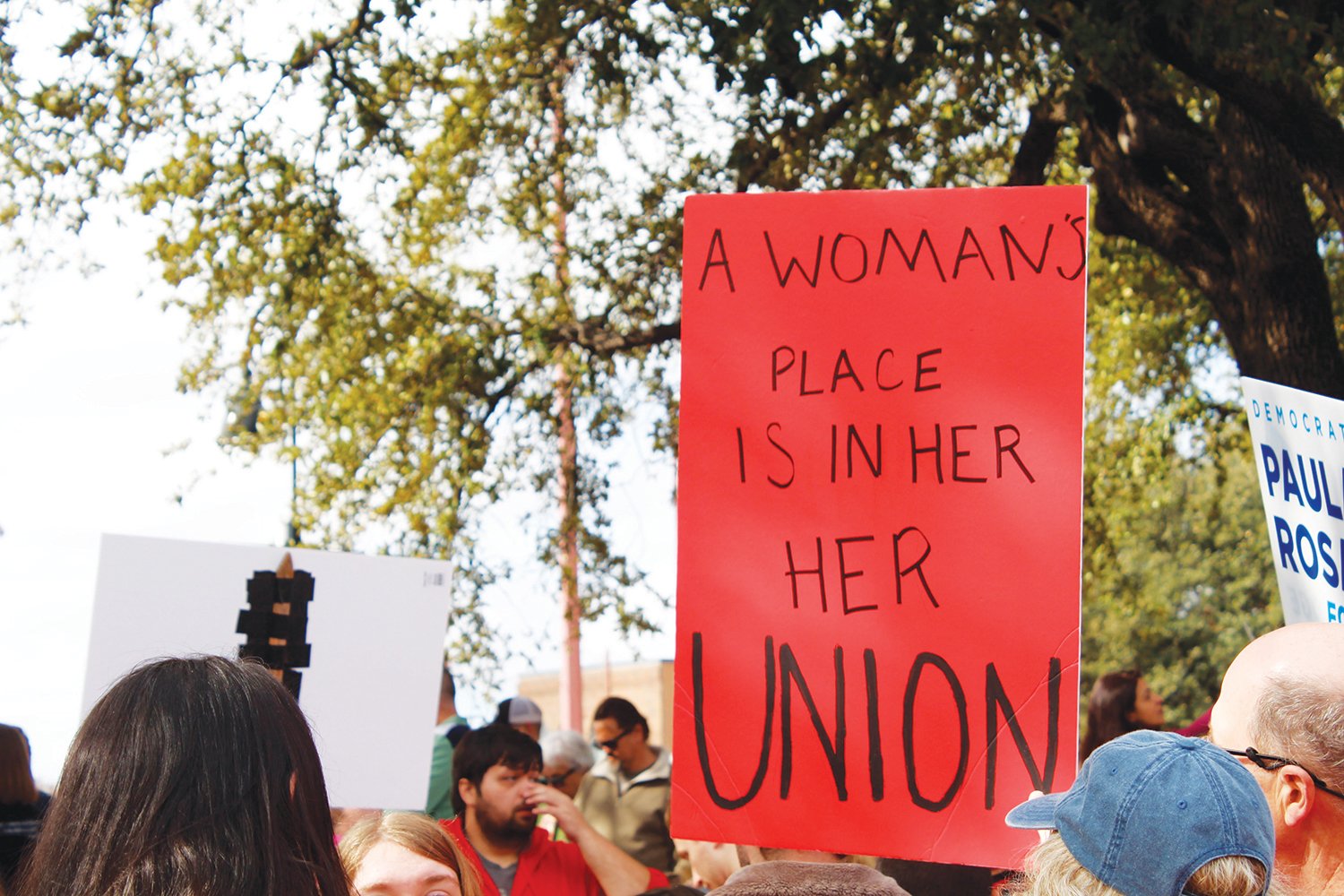
“Even a year ago, most us of weren’t where we are now politically,” said Kristian Hernandez, the 29-year-old co-chair of the 400-member North Texas DSA. “People have the potential to grow and be radicalized,” she said. “And it’s the only chance we have — because we need all of us.”
With about 37,000 dues-paying members spread across 200 local groups, DSA now dwarfs all other far-left organizations in America. There are at least 11 chapters in Texas, including in Houston, Dallas, San Antonio, Austin and El Paso. Nationwide, DSA claimed only 6,500 members in May 2016, but it grew rapidly alongside the Bernie Sanders campaign and exploded after Trump’s election.
DSA tends to support proposals on the left edge of the Democratic Party, like a $15 minimum wage and single-payer health care — issues that once seemed radical but, after Sanders’ campaign, are on the lips of many Democratic presidential hopefuls. In many ways, the tide is with DSA, and there’s reason to think it could be more durable than other far-left movements. The group engages in electoral politics and is open to organizational structure in a way the high-octane but short-lived Occupy movement wasn’t, and while DSA doesn’t shy from critiquing the Democratic Party as beholden to corporate interests, it generally shuns the pure, winless road of Green Party activism.
A rough analogue for DSA may come from the political right. Like the tea party of the early Obama years, DSA reaped the backlash to a controversial presidential election and swiftly became a home for those more radical than the mainstream parties. DSA, smaller and lacking billionaire backers, won’t be replicating the tea party’s 2010 victories any time soon, but to keep growing, it likely has to prove some electoral mettle. This year, some members will be testing socialism’s appeal in the Lone Star State. Could a new shade of red help Texas finally turn blue?

Franklin Bynum, a former Houston public defender, is running an insurgent campaign for an office most voters ignore: Harris County misdemeanor court judge. Thirty-five years old with a coiffed shock of brown hair, Bynum says he’s seen Houston’s criminal courts routinely railroad the poor into convictions that drive them ever further into poverty. A DSA member and one of four candidates endorsed by the Houston chapter, he now aims to turn one of those courts into a paragon of socialist jurisprudence.
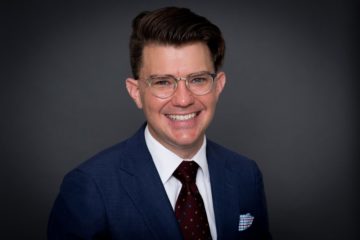
“Who are these courts being operated for? Right now, it’s the police, the bondsmen and the prosecutors, and people are just the raw material to be chewed up,” said Bynum, who’s running as a Democrat on a platform that includes greater use of personal recognizance bonds and waiving certain fees for the poor. “A democratic socialist judge would make the courts work for the people.” Bynum’s opponent in November will be Dan Simons, a former assistant DA who unseated a four-term Republican with a primary campaign calling attention to the incumbent’s officiating of same-sex weddings.
Bynum is the sort of candidate DSA aims for: He’s an open socialist; he was already active in the organization; and his campaign volunteers are DSA members. Bynum says that DSA’s backing emboldened him to run an active, issues-based campaign when other down-ballot Democrats were simply writing a check to the county party and hoping voter turnout would carry them to victory. “It’s about showing we have a vision of a better future,” he said, “in a time when there’s an overwhelming sense of despondency, and the Democrats are doing nothing to dissuade us of that.”
Unlike the tea party or the more recent Indivisible movement, DSA is focused on developing a small cohort of candidates from within its own ranks. The dues-funded organization, which pulled in $1.6 million in the first eight months of last year, aims to funnel limited resources to candidates it believes it can hold accountable. A national electoral strategy approved in late January calls for chapters to train more volunteers, maintain voter databases and eventually be able to “run a down-ballot campaign from start to finish” — as the Houston chapter is trying to do with Bynum. The strategy also reaffirms the group’s inside-outside approach, urging candidates to use the Democratic ballot line “strategically” while “build[ing] power independent” of the party.
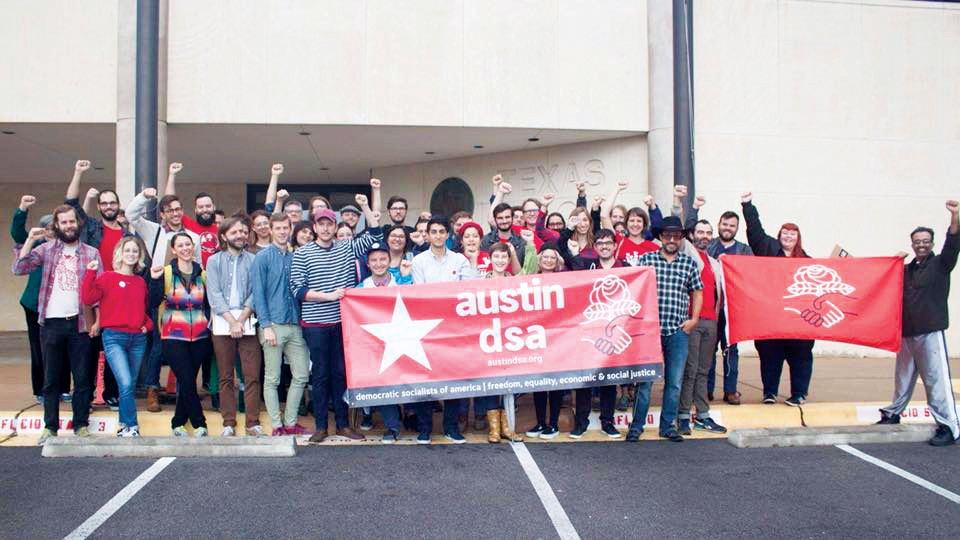
Bynum is one of at least 11 DSA members in Texas running for office this year. Of those, only three have official DSA endorsements so far; the group aims to avoid backing hopeless candidates, and it’s still ironing out its endorsement process. In a surprising primary victory, San Antonio high school teacher Rick Treviño, a DSA member who was endorsed by the group, squeaked into a runoff for Congressional District 23, a West Texas swing district that was hotly contested by five Democrats. Treviño was outspent roughly 19 to 1 by two of those opponents. But disappointment came for DSA members who campaigned hard for Derrick Crowe, an Austin environmental activist swept out of the running for retiring Congressman Lamar Smith’s seat by Mary Wilson, a little-known lesbian pastor. If any DSA members do taste victory come November, they would join around 40 others who currently hold elected office nationwide.
Christian Bowe, a 25-year-old from New Jersey who authored much of DSA’s electoral strategy and runs the group’s social media, said he thinks reasonable goals for November include seeing the first DSA member in Congress and reaching 100 elected officials nationwide. Bowe, a former Sanders campaign staffer with a large Twitter following, plans to use excitement about candidates as a recruiting tool: He thinks DSA could reach 50,000 members this spring as the election cycle heats up.
In many ways, the tide is with DSA, and there’s reason to think it could be more durable than other far-left movements.
Bowe cautions that elections are only stepping stones. “Winning races is a means to an end,” he said. “It’s simply much easier to fight for issues like Medicare for All and a higher minimum wage when you have people in office.” Already, presidential hopefuls Julián Castro, Elizabeth Warren, Kirsten Gillibrand and Kamala Harris have expressed support for single-payer health care.
To hold politicians accountable, the group believes, it needs a stronger and broader base. That’s why members generally call DSA a “movement” or “community” rather than a would-be party, and why the organization participates in street protests, encourages members to join unions and devotes energy to “mutual aid” volunteer activities like free flu shots, fixing brake lights and disaster relief. DSA members want to go beyond normal lefty bubbles, and they’re finding creative ways to do so.

In a poor Northeast Houston neighborhood in January, Howard Higdon shuffled out of his front door leaning on his walker, a cigarette in hand and a graying 14-year-old dachshund in tow. A 62-year-old native of the Bayou City, Higdon had been living for months with water damage and mold after Hurricane Harvey flooded his single-story brick home in August. That morning, a crew of nine Houston DSA members — seven men led by a pair of women — had arrived to perform free demo work: removing ruined drywall and flooring.
“It’s a blessing,” said Higdon, a retired truck driver who was denied FEMA cash assistance in September. Thirty-five years of hauling construction equipment around Texas had ruined his hips and knees, forcing him to retire, and he’d blown through all his savings on chemotherapy for his wife, who died in 2013. He now lives on a meager $1,300 monthly disability check. “I’m just surprised they have people like y’all that will come help people like me.”
Ever since the record-breaking storm hit Houston, the local DSA chapter, which has around 300 members, has gone out nearly every weekend to perform free “muck and gut” operations for Houstonians in need. The group crowdfunded more than $125,000 for the work, donating a large chunk to an immigrant rights’ nonprofit and doling out assistance to families at $200 a pop — on top of buying tools and a 2001 Ford Ranger. The group has worked on more than 50 houses so far.
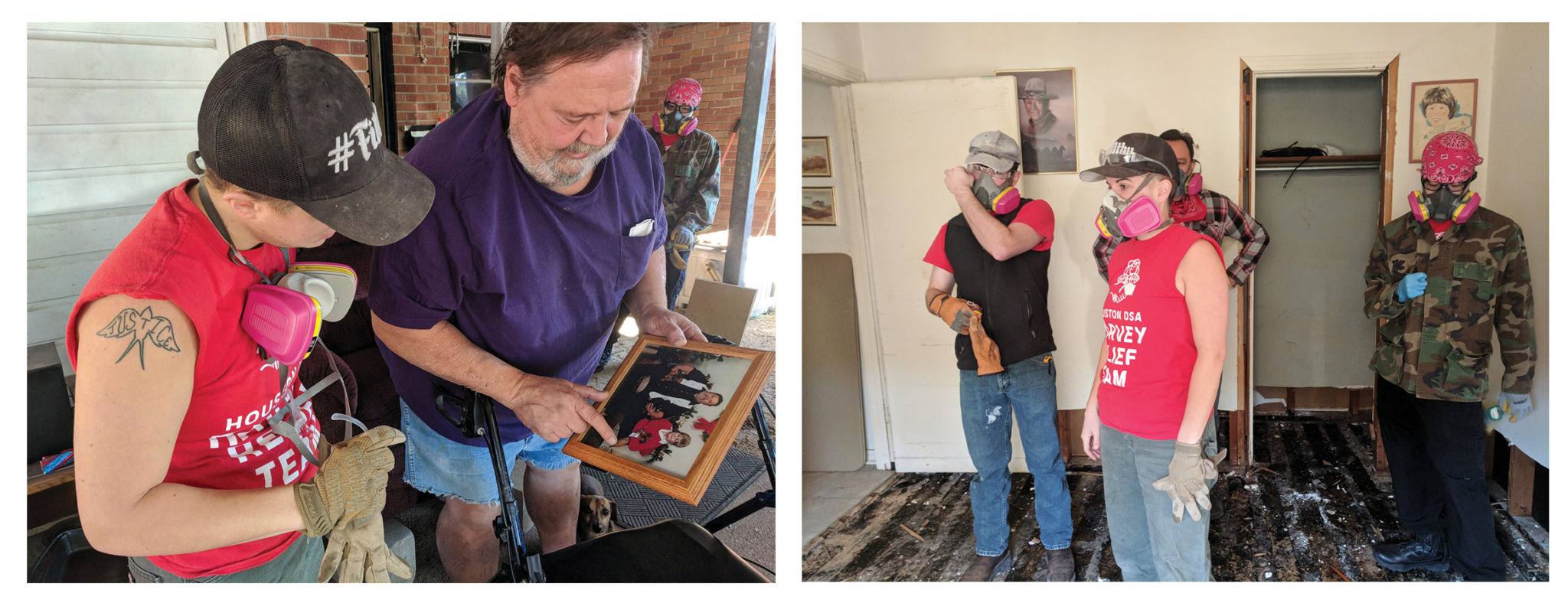
DSA members around the country have fixed drivers’ brake lights for free, accompanied immigrants to check-ins with authorities and raised $200,000 for victims of the attack in Charlottesville. That’s on top of canvassing extensively for single-payer health care, tenants’ rights and measures like Austin’s paid sick leave ordinance, the first such policy to pass in the South.
Unlike the tea party, which eventually faded at the grassroots level, DSA hopes to bolster the left over the course of years. DSA National Director Maria Svart said that while mutual aid can’t address America’s systemic problems, it can build social bonds within and beyond the organization. “What our groups are doing is putting down roots,” Svart said. “We’re providing a place where people can be together, recognize what’s happening and move to action together.”
Mutual aid can also be a tactic for reaching people otherwise scared off by the word “socialism,” argued Allie Cohn, a national leader from Knoxville, Tennessee. “There are certain areas of the country where you have to show people who you are, more than tell them,” she said.
“It’s about showing we have a vision of a better future when there’s an overwhelming sense of despondency, and the Democrats are doing nothing to dissuade us of that.”
Multiple members told the Observer that DSA is like “socialist church” — a mirror of the evangelical spaces that the right leverages so well. “The feeling, the inspiration to do work, it’s the same structure,” said Colleen Kennedy, 27, who’s Catholic and a leader of the Houston demo squad. “It’s community.”
Some said DSA filled a void created when they left the congregations of their youth. Austin Co-Chair Dave Pinkham said DSA’s “social cohesion” jolted him back to his Southern Baptist upbringing. “The church is so powerful because it’s a social, political force where people have a line they’ll stand on,” he said. “That’s what we have to do.”

But not everything’s been bread and roses for the upstart organization: DSA has shown signs of the sort of infighting endemic to radical political groups.
At the group’s national convention in Chicago last August, tensions arose between the old guard and the new. The body voted to support the boycott and divestment movement against Israel, prompting a few older members to write public condemnations. A controversial proposal to distance DSA from the Democratic Party, which called progressive Democrats “our competitors in the area of ideas,” drew 40 percent support. And then, there was what members sometimes call “Fetonte-gate.”
Danny Fetonte, a retired union organizer and longtime Austin activist, was elected to DSA’s national leadership at the convention. What many didn’t know was that Fetonte had spent five years as an organizer with Texas’ largest police union, the Combined Law Enforcement Associations of Texas. While Fetonte was on his flight back to Austin, an anonymous Twitter account critical of DSA began tweeting about his old job, setting off a social media firestorm. Many began falsely labeling him a “cop” or a “pig,” a slew of local DSA groups called for him to step down, and Fetonte says he received threats of violence.
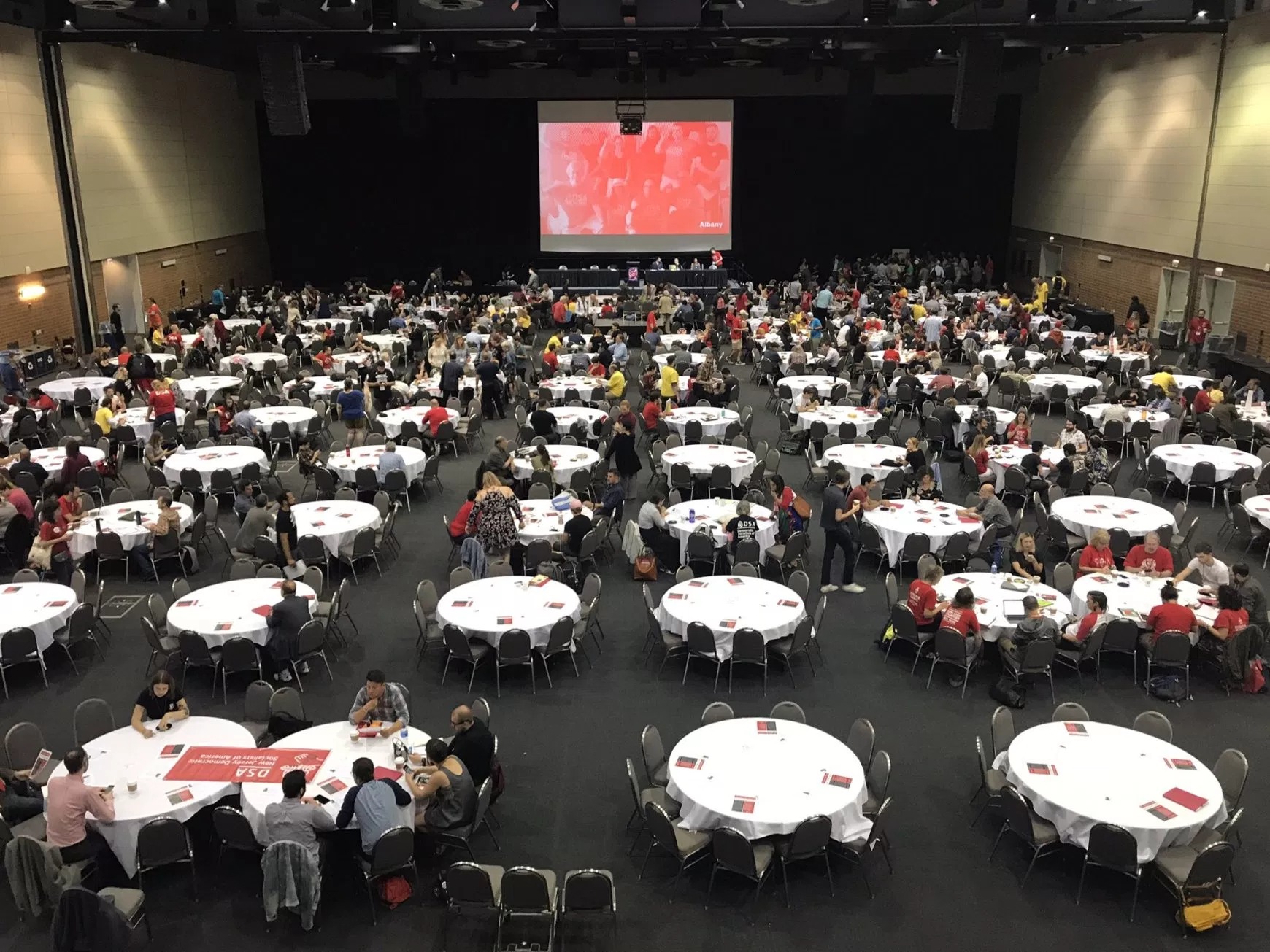
National leadership censured Fetonte for not disclosing his work history, and he resigned in frustration. He wrote in a statement, “At the national [level], DSA extremists with less than one year in DSA dominate the leadership,” arguing that the Austin chapter — which now claims some 800 members — grew through coalition building, not radical posturing. Elsewhere, he attacked what he saw as a new and toxic online culture in DSA, describing “internet bullies who act tough behind a keyboard but have never been hit by a billy club, never been in a street fight, never fought scabs on a picket line, and never been arrested.”
On the latter point, Svart partly concurred: “There’s a way of being radical in this country that’s oriented more toward proclaiming one’s politics than collective action, and many people have been raised to believe that’s organizing.” Svart said DSA is a first chance for many to engage in face-to-face organizing, and the group is “struggling” to build up communications infrastructure to let members resolve disagreements more productively.
Ultimately, the Fetonte scandal sowed acrimony within the Austin branch and caused some longtime members to leave. Chau Ngo, then-chair of the Austin DSA, described Fetonte’s exit as a “shocking and sad end to a long and terrible episode.”
Other problems for DSA include an obvious lack of diversity. The group is about 90 percent white and 75 percent male, according to The Nation, numbers that Svart wouldn’t confirm but called “not totally inaccurate.” (The elected leadership is more balanced, since DSA rules dictate that no more than half of national leadership and local co-chairs be men.) And geographically, membership is concentrated on the coasts: Eight of the 10 largest chapters are in the Northeast or the West Coast, and of the 17-person national leadership, more than half are from the Northeast.
“There are certain areas of the country where you have to show people who you are, more than tell them.”
Many DSA members told the Observer that what works in New York or the Bay Area may not work in the South. In Texas specifically, DSA’s prospects seem dim at first blush: Democrats have been getting whipped here for two decades, Sanders pulled only 33 percent in the 2016 primary and organized labor is nearly nonexistent. But, electorally at least, the state’s lack of progressive infrastructure could work to DSA’s advantage.
As Cliff Walker, staffer with the Texas Democratic Party, put it: “Maybe in other places there’s hostility [between DSA and the Democratic Party], but in Texas — where there hasn’t really been national investment — the cavalry is all of us.” Walker added that he didn’t mind that DSA supports only a fraction of the Democratic slate. “Given how grave the stakes are, we either hang together, or we hang separately,” he said.
It’s been a century since an American socialist group was as relevant as DSA. In 1912, the Socialist Party of America claimed 113,000 dues-paying members. Its perennial presidential candidate, Eugene Debs, once pulled 6 percent of the vote, and Hallettsville newspaperman E.R. Meitzen placed second in the 1914 Texas governor’s race. But by the mid-’20s, the party had largely fallen apart amid infighting, and ever since, American socialism has been largely an affair of sects, schisms and irrelevance. That’s a fate DSA hopes to avoid.
One evening in January, over drinks at a bar near the University of Texas at Austin, I asked a DSA member what might stop the organization from falling apart — from splintering and reverting back to the tiny group it so recently was. “It’s simple,” the member said, setting his beer down on the picnic table. “We actually have something to lose now.”
Top photo by Gus Bova.

